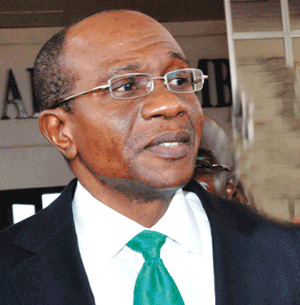The Central Bank of Nigeria (CBN) says it will continue to defend the naira with foreign exchange (forex) reserves because no country allows a free float of its currency.
Tension over the postponement of the election last week stoked further crash of the naira on Wednesday, February 11 on the interbank market, and that fuelled apprehension in the debt and equity market.
Thee naira closed at N205 to the dollar on February 11 and the following day ended at a new record low of N205.60 to the dollar, compared with the CBN’s target range of between N160 and N176.
Forex dealers noted further intervention during chaotic trading on both days that necessitated banks to trigger an agreed ‘circuit-breaker’ to halt electronic trading because of the pace of the fall of the naira.
To stem the slide against increasingly strong dollar, the CBN has been drawing on forex reserves each trading day it intervenes.
However, CBN Governor, Godwin Emefiele, said on February 12 that the naira is “appropriately priced” despite about 25 per cent slump against the dollar in the past three months.
He told investors and the capital market community at the Nigerian Stock Exchange (NSE) that “we are not in the best of times but there’s no need to panic because the economy is resilient and therefore will get over the challenges.”
Earlier in the day, the Bankers’ Committee of the CBN emerged from a closed door meeting in Lagos to assure investors and the public that the banking system remains strong despite challenges in the economy caused by falling oil price.
Managing directors of banks and members of the Bankers’ Committee renewed the commitment of the CBN to defending the naira, saying a lot of effort is being made to raise non-oil sector earnings to boost forex reserves.
External reserves have been on the decline since last year as the CBN struggles to defend crashing naira. Its latest update on the reserves said the stockpile of dollars dropped to $33.4 billion as of Tuesday, February 10, a decline of $1 billion in nine trading sessions since January 28.
The more than 50 per cent slump in crude oil price since last year has left the economy, which gets 70 per cent of income and 95 per cent of forex from oil sales, in a fierce struggle to adjust to the hard reality of nonexistent savings for a rainy day.
CBN Director (Banking Supervision), Tokunbo Martins, said the committee discussed the state of the economy, “and it was encouraging to know that despite all the headwinds, global and domestic, the banking industry remains safe, sound, and resilient.”
She disclosed that deposit money banks were assessed in terms of capital adequacy level, liquidity, profitability and asset quality, and found to be above regulatory minimum.
“It was concluded that all the ratios remain satisfactory. On the industry at large, all the banks were on average, above the regulatory minimum,” she assured.
Guaranty Trust Bank Managing Director, Segun Agbaje, added that banks exposed to the oil industry should not worry as those that finance the upstream can elongate the tenure of loans as long as there are reserves.
“I don’t think there is any cause for concern and I think some of these have been overblown,” Agbaje maintained.
The committee agreed that there will be no change in the operation of domiciliary account and that an account holder will continue to have unfettered access to inflows and outflows.
The CBN, believing that domiciliary transactions are used for round tripping by banks, had directed them to submit details of domiciliary account holders, including name, account number, and balance as of January 29, 2015.
This raised fears on the operations of domiciliary accounts.
The CBN also asked banks to present total balance of all domiciliary accounts by that date, as well as lists of corporate domiciliary account holders and their balances, individual domiciliary account holders and their balances, public sector institutions domiciliary account holders and their balances, and the mode of lodgement in the accounts (cash or wire transfer).
Domiciliary deposits were equivalent to 21 per cent of the N17 trillion or $19.5 billion deposits in the banking system at half year 2014, according to data from Renaissance Capital, an investment firm.














